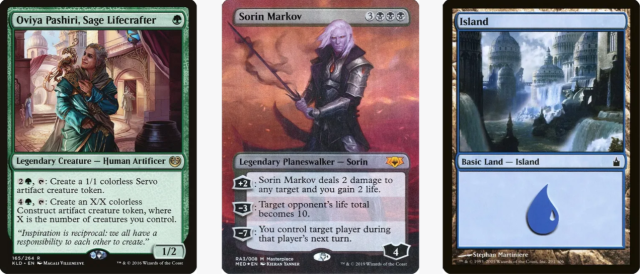This year on Easter, after a lovely dinner with my partner and son, and after we each looked to see what the Easter Bunny had put in our Easter baskets, we settled down to consider playing the board game Bunny Kingdom. (If you’re guessing we celebrate what might be described as a “secular pagan” version of the holiday, you’d be correct – bunnies and eggs and candy are at the forefront.)
As I read the Bunny Kingdom rules, I found myself becoming sleepier and sleepier. My partner and son didn’t care – they were eagerly discussing the upcoming new set of cards for Magic: The Gathering. I then curled up for a nap, but kept listening to the two of them.
After a bit, I noticed that some of the new Magic cards were “good,” while others were “sweet!” I asked about this and was told the two terms are not synonyms – a card can be good but not sweet, or sweet but not good, or neither, or ideally, both. After following their conversation a bit longer, I suggested that maybe “good” means it’s a rational, calculated judgment, while “sweet!” is more emotional. They agreed.
You may not know anything about Magic: The Gathering beyond what I’ve just told you – it’s a game played with cards that come out in sets. If you’re curious, I can add that the game’s been around for 30 years. It has millions of players and generates several billion dollars in revenue each year for the company that owns it, which is currently Hasbro. About four times a year, new sets of cards are released, each set having its own theme but also including ongoing themes and characters.

I’m not here to talk about Magic, though – what I’m interested in here is that good/sweet distinction. We like some things for rational reasons, and others for emotional reasons.
I’m not going to claim those are two separate things. Pretty much everything has an emotional charge, otherwise we’d pay little attention to it. Believing that something is rational, orderly, logical, elegant, efficient, thorough… that comes with a certain emotional satisfaction.
But I would also make the case that emotional responses to abstract things, things that don’t affect us directly, happen for rational reasons. There are predictable patterns for considering something to be exciting, dramatic, extraordinary, or “sweet.” The book I’ve been writing for the past year is on this very topic: thinking systematically about the categories of things that capture and often retain our attention because of their emotional resonance. I’m not going into details now; that can wait until I’ve finished writing it (and I’m 80% done with the first draft, so it won’t be too long).
Nevertheless, when I say we like some things for rational reasons and others for emotional reasons, we all know what I’m talking about.
How does this apply to political psychology, the usual topic of this blog? It probably comes up most often in policy ideas, the stuff campaign promises are made of. Just because an idea is “sweet” doesn’t mean it’s “good”!
Many “good” policies are rather too boring for public debate; we more or less trust the government to take care of those without our input. (Specifically, we trust them “more” when our party is the one in charge, and “less” when it’s the other folks, although usually the administrators from both parties are competent, and there’s a lot of government that’s generally non-partisan.)
On the other hand, policy ideas that get a lot of publicity are those intended to be “sweet,” at least for some audiences. If we’re excited about a politician’s ideas, we’re more likely to pay attention to them, say positive things about them, and vote for them.
And although we certainly hear people talking about policies they don’t like, we hardly ever hear people pointing out that a policy is “sweet” (exciting) but not very “good” (making rational sense). Rather, people tend to assume that if it feels “sweet” it must be “good.”
So what’s the difference between Magic and public policies? Why don’t we get this good/sweet distinction when it comes to these issues that affect our lives? I think it comes down to education.
When it comes to new Magic sets, my partner and son are both highly educated. My partner’s played on the Magic pro tour three times, winning free trips to Malaysia and Spain. And while my son’s never played on the Magic pro tour, the cash prize from his best tournament outcome was rather higher than anything my partner’s yet achieved. At their level of play, it’s natural to distinguish between cards that seem cool (“sweet”) and those that are actually solid (“good”). For newer, more casual players, that distinction may not be as relevant yet.
I think this probably applies to politics as well. We could all benefit from paying more attention to the way that leaders can manipulate us by offering ideas that sound great but don’t really follow through. A good example could be the 2017 Tax Cuts and Jobs Act, which was presented as a benefit for American families but dramatically favored the very rich.
I suggest we could use more education on two levels. First, we could all stand to be better informed about the issues facing our countries and the costs and benefits of potential solutions. If we were, we’d be more likely to understand when something is actually “good” – reliably designed to achieve outcomes consistent with our goals.
And second, as my research has shown, we could do with a bit more skepticism about policies described in emotionally appealing ways. I don’t mean cynicism, I mean open-minded questioning – subjecting these ideas to some critical analysis before jumping on the bandwagon.
If that were the case, then maybe our political discussions would be more likely to include comments like, “That proposal sounds sweet, but it’s not very good, is it?”
Candy photo credit: https://tastyoven.com/wp-content/uploads/2021/03/Easter-charcuterie-candy-board-vertical.jpeg
